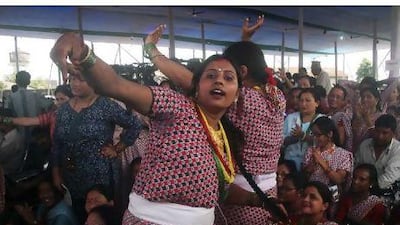NEW DELHI // As Roshan Giri was preparing to sign the agreement that would give him and other Gurkhas a modest degree of self-rule in West Bengal, he suddenly realised the enormous impact of a simple scrawl of his pen.
"I was quite nervous," recalled Mr Giri, the general secretary of Gurkha Janmukti Morcha (GJM), the largest of three Gurkha political parties. "It was just for a little bit, in that moment … when I was about to sign, because I realised that I was doing this on behalf of so many people."
In India, of course, any assessments of size are relative. While the Gurkhas are a Nepali-speaking community of 10 million people, known abroad mainly for their military prowess, they are but a tiny fraction of India's 1.18 billion people.
However, their successful bid for control over some of their community's affairs in West Bengal, enshrined in the accord signed on July 18 by Mr Giri, state and federal authorities that created the Gorkhaland Territorial Administration (GTA), resonates far beyond the confines of India's fourth most populous state.
For some Indians, the agreement represents a slippery slope towards an India divided and subdivided endlessly and uncontrollably on the basis of language, ethnicity, caste and religion.
Mr Giri and other Gurkha leaders have done little to assuage those fears, refusing to deny suggestions that the GTA is but a stepping stone to their ultimate goal of a separate state India's Gurkhas in the hilly north-east of West Bengal.
"In the nomenclature it still says something about Gorkhaland and the right to its own state," Mr Giri said. "We are on the right path. This is a step forward. We are going ahead. We consider this the first type of achievement for the people."
The struggle for Gorkhaland, which began in the 1980s, has been long and sometimes bloody, fuelled by what members of the community in West Bengal alleged was discrimination in employment, education and infrastructure. An estimated 1,000 people have been killed in sporadic fighting.
The Gurkhas demand to manage their own funds instead of relying on the state treasury for support went nowhere until the communist Left Front government that ruled West Bengal for 34 years was ousted in elections earlier this year.
"The Left Front government did not have the political will," Mr Giri said. "They were never sincere about solving the problems of the area."
The Front's successor, headed by the Trinamool Congress, moved quickly to reach a deal with the state's Gurkha community: too quickly for some.
BD Ghosh, a senior fellow at the Institute of Social Sciences in New Delhi, thinks it "curious and abnormal" that an agreement was reached so fast.
"It wasn't that the Left Front didn't want to discuss Gorkhaland, just that they couldn't find any solution," Mr Ghosh said. "And now so soon an agreement has been reached. How did that happen? Maybe this was an arrangement in return for electoral support, I don't know."
Although no quid-pro-quo agreements were reported in the run-up to the West Bengal elections in April, Mamata Bannerjee, the leader of the Trinamool Congress who signed the agreement granting semi-autonomy to the Gurkhas, stated often during the campaign that resolving the 20-year-old Gorkhaland conflict was a priority.
Mr Ghosh remains sceptical of the new agreement. The Gurkhas' demand for autonomy extends beyond three mountainous territories covered by the agreement into the "dooars", the plains at the foot of the Himalayas. Since the Gurkhas have not formally relinquished these claims, Mr Ghosh believes that this agreement, at best, postpones a resolution.
"If the West Bengal government has tacitly agreed to that - and right now we don't know if they have or not - the Gurkhas will naturally think that this agreement is the first step towards statehood," Mr Ghosh said.
"If you've agreed in principle that all Nepali-dominated areas should be given over to them, what happens next? In Silchar [in the state of Assam], they can claim to be with [the state of Tripura], since the majority in Silchar speaks the same language as Tripura," he added.
Some analysts, such as the historian Ramachandra Guha, have argued in favour of creating more small states in India.
"The experience of the past few decades suggests that smaller states are, on the whole, conducive to good (or at least less dreadful) governance," Mr Guha wrote in the Calcutta Telegraph in February as debate raged over whether an additional state should be carved out of the southern state of Andhra Pradesh.
But Mukunda Majumdar, president of the Bangla O Banglabhasha Bachao Committee, which says it is fighting to protect the Bengali language and people, believes the agreement creating the Gurkha-administered territory in West Bengal sets a bad precedent.
"All the minority communities will be encouraged to take part in separatism due to the success of this agreement," he said.
Referring to previous divisions of the state of Bengal in 1905 and 1947, Mr. Majumdar warned: "This will lead to the partition of West Bengal. We don't want to do it again. We don't want any more suffering of the Bengali people who will be turned into refugees again."

